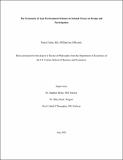| dc.contributor.advisor | Hynes, Stephen | |
| dc.contributor.advisor | O'Donoghue, Cathal | |
| dc.contributor.advisor | Ryan, Mary | |
| dc.contributor.author | Cullen, Paula | |
| dc.date.accessioned | 2022-03-22T14:59:18Z | |
| dc.date.available | 2022-03-22T14:59:18Z | |
| dc.date.issued | 2021-08-28 | |
| dc.identifier.uri | http://hdl.handle.net/10379/17049 | |
| dc.description.abstract | Addressing the degradation of the environment has become increasingly important on a global scale. With agriculture representing a large portion of land, pressure is on policymakers to ensure that farmers are contributing to the stability and improvement of the environment. Agri-environment schemes (AESs) have become one of the most important policy tools available to influence farmers to make positive changes particularly in relation to biodiversity and water quality. AESs generally involve farmers undertaking certain management actions that are aimed at improving the environment and they are then compensated for the costs of doing so. The success of past schemes has been questioned and with a new Common Agricultural Policy (CAP) period about to begin, it is the valuable time to investigate how schemes could be modified so environmental improvements from the next generation of AESs are realised.
The focus of this thesis is to contribute a greater understanding of the success and failures of past schemes through analyses of the design of schemes and the type of farmer who participates. To do so Chapter 2 first examines the design options available to policy makers. Using Ireland as a case study, Chapter 2 assesses the evolving structure of AES design in the context of changing environmental targets. It analyses past and current AESs and other measures with reference to the spatial pattern of environmental public goods. Chapter 3 examines the design of past schemes from the perspective of experts in AESs from a number of fields and summarise their opinions on the shortcomings of past schemes and their proposals for future improvements.
The next two empirical chapters examine an area often used to measure the success of schemes, farmer participation. The first of these investigates the impact that changes in scheme design and agricultural policy have had on the type of farm to participate in schemes. To do so a random effects logit model is used on a nationally representative panel of Irish farmers spanning 23 years. Chapter 5 focuses on the participation choice through a lens of farmer self-identity and their attitudes towards schemes. This chapter uses a nationally representative survey of 1000 Irish farmers with a combined factor analysis and regression analysis methodology to provide a better understanding of the choice to participate. The final empirical chapter (chapter 6) focuses on the determinants of the perceived costs of agri-environment schemes, a known influencer of participation. The model employs results of a survey of farmer’s estimated costs of participating to better understand why some farmers perceive higher costs than others. | en_IE |
| dc.publisher | NUI Galway | |
| dc.rights | Attribution-NonCommercial-NoDerivs 3.0 Ireland | |
| dc.rights | CC BY-NC-ND 3.0 IE | |
| dc.rights.uri | https://creativecommons.org/licenses/by-nc-nd/3.0/ie/ | |
| dc.subject | Environmental Economics | en_IE |
| dc.subject | Agricultural Economics | en_IE |
| dc.subject | Agri-environment | en_IE |
| dc.subject | Agri-environment schemes | en_IE |
| dc.subject | Agricultural Policy | en_IE |
| dc.subject | Business, Public Policy, and Law | en_IE |
| dc.subject | Business and Economics | en_IE |
| dc.subject | Economics | en_IE |
| dc.title | The economics of agri-environment schemes in Ireland: Essays on design and participation | en_IE |
| dc.type | Thesis | en |
| dc.contributor.funder | Teagasc | en_IE |
| dc.local.note | This thesis analyses agri-environment schemes in order to improve the understanding of past successes and failures. In particular the thesis focuses on design of schemes and the type of farmer to participate. | en_IE |
| dc.local.final | Yes | en_IE |
| nui.item.downloads | 205 | |


